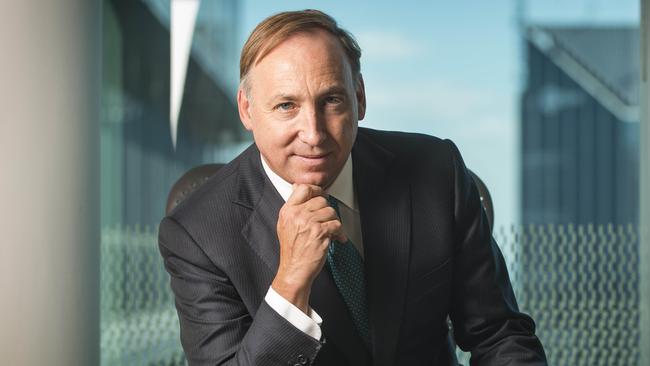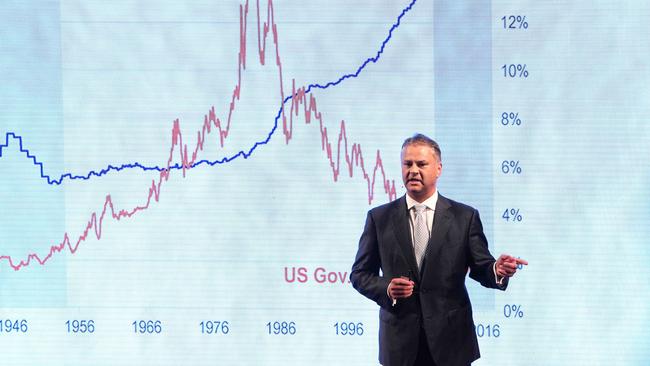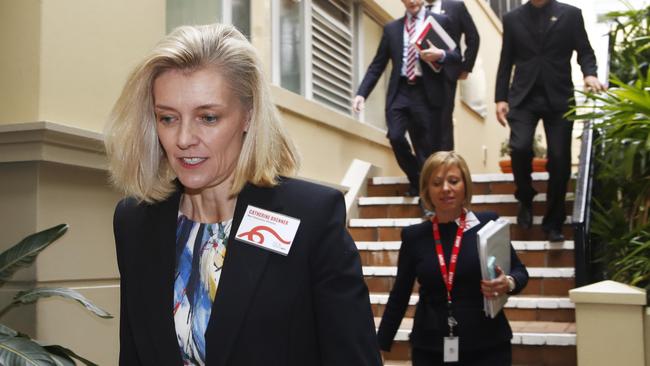Investors slam banks’ short-term profit focus
Australia’s largest investors say banks set themselves up for a backlash with a too-narrow focus on short-term profits.

Australia’s largest investors have lashed the heavy focus on short-term profits by the nation’s biggest banks, which they say have driven the scandals unearthed by the royal commission into the financial sector.
Mark Delaney, chief investment officer of the $130 billion AustralianSuper fund, said the largest banks were “too narrowly focused on short-term profitability”, which led to them overlooking their obligations and mismanaging their businesses.
“It’s been disappointing what’s been happening in the banking sector,” Mr Delaney said, arguing that the banks had “set themselves up to some extent for a public backlash”.
Just two months into formal hearings, senior counsel assisting the royal commission Rowena Orr QC has grilled the Commonwealth Bank, Westpac, National Australia Bank and ANZ, with hearings diving into such scandals as mortgage fraud, bribery, false documentation, failure to verify customer income, not assessing expenses, failure of internal controls to remediate breaches and failures to report misconduct to the corporate regulator.
Scandals have also hit the wealth management industry, with the largest groups in Australia, such as AMP, embroiled in a fee-for-no-service scandal, along with a litany of stories about dodgy advisers who remained in the industry.
Mr Delaney said AustralianSuper, which looks after the savings of around two million workers, was a long-term investor in the companies, and looked to hold the stocks for between 20 and 30 years.
“It would have been good for these issues to have been addressed before we got to a royal commission,” Mr Delaney told the Bloomberg Invest summit in Sydney.
He said when AustralianSuper now engages with the banks, their boards and chief executives, “they’re far more receptive” to focusing on the long term than they were two years ago.
UniSuper chief investment officer John Pearce, who looks after about $65 billion in savings for the education sector, said he wasn’t shocked by the revelations in the royal commission.
“In terms of the royal commission — I might be an outlier — there’s been a lot of theatre and some personal reputations may have been sullied. But has it covered anything of a systemic nature that we didn’t know about? I doubt it,” Mr Pearce said.
He said he found two reports by the prudential regulator into the financial system “more damning” than the royal commission.

Commonwealth Bank was late last month forced to put aside $1bn in extra regulatory capital following the Australian Prudential Regulation Authority’s investigation of the bank’s culture and governance, launched in the wake of money laundering allegations, the life insurance scandal and the financial planning debacle.
The review found the bank was guilty of “complacency” and of having a “reactive stance”, as well as being insular and not learning from experience and mistakes.
A separate investigation by the prudential regulator involved a targeted review of the major lenders, which showed a third of a sample of loans sold by Westpac were not checked for proof of borrower income and the majority were assessed against a much-criticised benchmark which underestimates household expenses.
Documents tendered to the royal commission show APRA chairman Wayne Byres said Westpac was a “significant outlier” compared to the other major banks after the targeted review, with the independent expert PricewaterhouseCoopers finding eight of the company’s mortgage “control objectives” were ineffective.
Mr Pearce said UniSuper had given a strong message to the AMP board over its handling of the fees-for-no-service scandal, which involved doctoring a report sent to the corporate regulator.
“When you see directors and chief executive officers resign, you can guarantee Australian investors are having tough discussions behind closed doors,” Mr Pearce said. “Media is a last resort; we don’t resort to that unless we have to.”
Embattled former AMP chair Catherine Brenner today announced she will leave her role as a director of Coca Cola Amatil, succumbing to shareholder outrage in the wake of the royal commission revelation.
The AMP board imploded in the lead-up to last Thursday’s annual meeting. Ms Brenner resigned, chief executive Craig Meller retired early, and directors Holly Kramer and Vanessa Wallace resigned ahead of certain defeat in their re-election polls. The company’s longest-serving director, Patty Akopiantz, will step down before the end of the year.

Brendan Casey, general manager of investments at REST Industry Super, which manages about $50 billion of retirement savings for retail workers, said it would take “a long time” to rebuild trust in the financial sector.
“We’ve got to be focused on governance. That’s how we get those long-term retunes for our members,” Mr Casey said. The “impact on trust takes a long time to rebuild and that spreads across the whole industry,” he said.
Damian Graham, the chief investment officer at First State Super, which manages about $90 billion of savings, said what came out in the royal commission wasn’t “hugely surprising”.
“We’ve had active engagement with the big financial services providers of the last two or three years,” Mr Graham said. “It’s not hugely surprising what’s come out, but I think the amount and the detail is a little bit worse than what’s been expected. From here, the ability to regain trust and for the community to regain trust in financial services is really crucial,” he said.
Brett Himbury, chief executive officer of IFM Investors, which manages infrastructure assets on behalf of the industry fund sector, said “more of the community mistrusts us than trusts us”.
“There is a risk that we all get seen to be financial people acting in our short-term interests rather than the long term interests of our members. That’s a risk for the entire sector,” Mr Himbury said.
“If you say you’re acting in your customers’ or shareholders’ interest, for god sakes do it. We clearly need to support the interests of our shareholders, but we absolutely have a fiduciary interest in looking after our members,” he said.




To join the conversation, please log in. Don't have an account? Register
Join the conversation, you are commenting as Logout